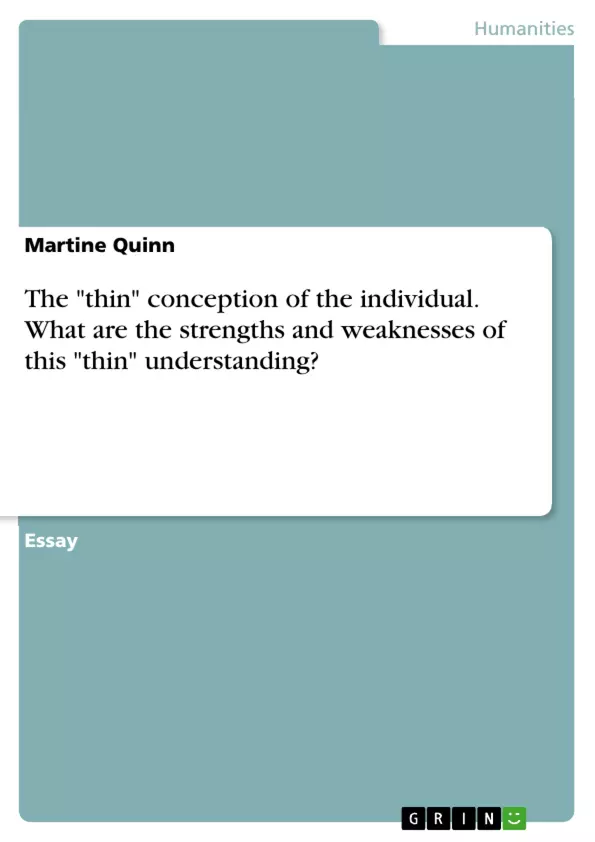The conception of the thin individual is one that there is no real inner self waiting to unfold, but rather a malleable dumb creature. According to the thin conception of the individual, what is taken as innate human attributes, such as to think, act, and so on, are just cultural and historical variables. As Colin Wilson suggests, Descartes should have followed his assertion ‘I think therefore I am’ with the question ‘Yes but who am I’? Not the social constructed person or even the socio-technical person. The inner world reality of consciousness, the will to love, fight, have sexual relations etc. As Erich Fromm claims, many sociologists are in essence apologists for and not critics of the existing social system.
Inhaltsverzeichnis (Table of Contents)
- The'thin' conception of the individual. What are the strengths and weaknesses of this 'thin' understanding?
- The thin conception of the individual has endured historically from the inception of sociology.
- In an era of neo-liberalism, Callon (2005) cited in (du Gay, 2008, p.33) claims from an Actor-network theory (ANT) that the individual does not possess agency rather it is distributed through agencements.
- Therefore, the self is not one that possesses consciousness it is only the outcome of the agencements in which any actor finds them-selves.
- Therefore if the individual and the social are two sides of the same coin, the question is what kind of personhood is made possible by these social worlds.
- However, Bourdieu underestimates the agency that an individual has within a working class habitus.
- Thin conceptions of the individual overstate the extent to which agency is distributed (Open University, 2015)
- As Bourdieu, 1990 [1984} cited in (McFall, 2008, pp.67-68) also points out in distinction that all classes want the same material and cultural goods, that are often mediated through advertising.
- From the inception of sociology, Karl Marx and Emile Durkheim thought sociology would be able to explain why societies took the form they did, and suggest ways to make it better for everyone (Open University, 2015).
Zielsetzung und Themenschwerpunkte (Objectives and Key Themes)
This essay explores the concept of the 'thin' individual, which posits that there is no inherent inner self but rather a malleable being shaped by social forces. It examines the strengths and weaknesses of this perspective, particularly in relation to sociological theories of agency and structure. The essay analyzes the concepts of agencement and habitus to understand how individuals are constructed and how social structures influence their actions.
- The limitations of the 'thin' conception of the individual
- The role of social structures and agency in shaping individual behavior
- The impact of cultural and historical factors on individual development
- The critique of neo-liberal ideology and its implications for individual agency
- The importance of a thick conception of the individual that acknowledges inherent capabilities and the potential for change
Zusammenfassung der Kapitel (Chapter Summaries)
The essay begins by introducing the 'thin' conception of the individual, which views individuals as malleable and shaped by social forces. It contrasts this with the 'thick' conception, which emphasizes the inherent capabilities of the individual. The essay then explores the historical development of these concepts, citing the work of Mauss, Weber, and others. It examines how cultural and historical factors influence individual behavior and how techniques of the body are learned and practiced.
The essay then delves into the concept of agencement, which posits that agency is distributed through networks of relations between people, things, and social practices. It uses the example of self-service shopping to illustrate how agency is not inherent but rather emerges from the interaction of individuals and their environment. The essay then examines the concept of habitus, which refers to the embodied practices and dispositions that are shaped by social class. It discusses Bourdieu's theory of distinction and how habitus influences individual tastes, preferences, and life chances.
The essay concludes by critiquing the limitations of the 'thin' conception of the individual and arguing for the importance of a thick account that acknowledges the inherent capabilities of individuals. It challenges the view that agency is solely distributed through social structures and emphasizes the need for a sociological perspective that can explain why societies take the form they do and how they can be made better for everyone.
Schlüsselwörter (Keywords)
This essay focuses on the concepts of the 'thin' and 'thick' conceptions of the individual, agency, structure, agencement, habitus, social class, neo-liberalism, and sociological imagination. It explores how these concepts intersect and contribute to understanding the complexities of individual behavior and social structures.
Frequently Asked Questions
What is the "thin" conception of the individual?
It is the idea that there is no inherent inner self, but rather a malleable creature shaped entirely by social, cultural, and historical variables.
What is the concept of "agencement"?
Agencement suggests that agency is not something an individual possesses, but is distributed through networks of relations between people, objects, and practices.
How does Bourdieu's "habitus" relate to this topic?
Habitus refers to embodied practices and dispositions shaped by social class, which influence an individual's tastes and actions while limiting perceived agency.
What is a major weakness of the thin understanding?
Critics argue it overstates the extent to which agency is distributed and ignores the inherent consciousness and will of the individual.
What did Erich Fromm claim about sociologists in this context?
Fromm claimed that many sociologists act as apologists for the existing social system rather than critics, by treating human attributes as mere variables.
- Citar trabajo
- Martine Quinn (Autor), 2016, The "thin" conception of the individual. What are the strengths and weaknesses of this "thin" understanding?, Múnich, GRIN Verlag, https://www.grin.com/document/351566



